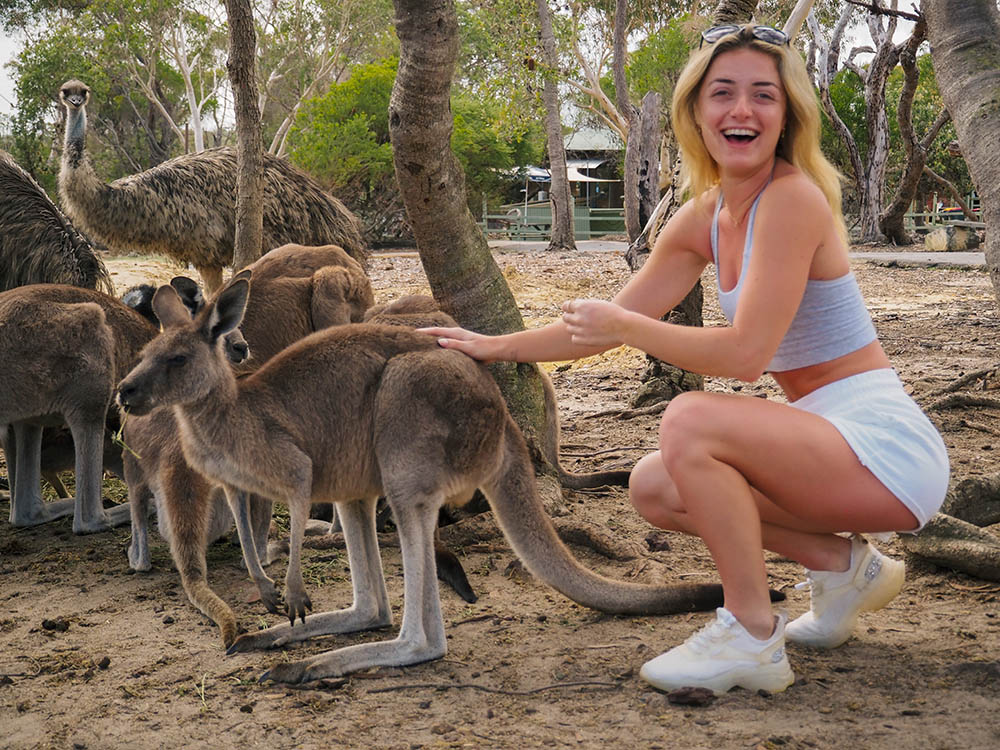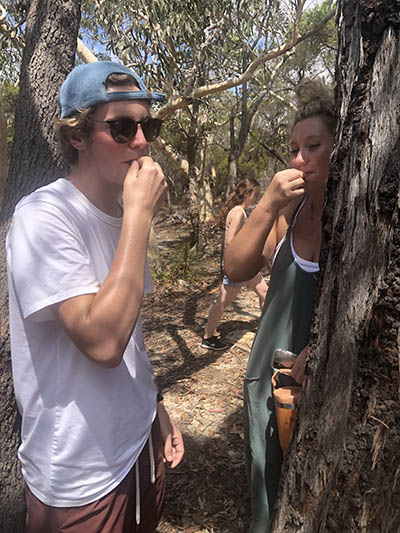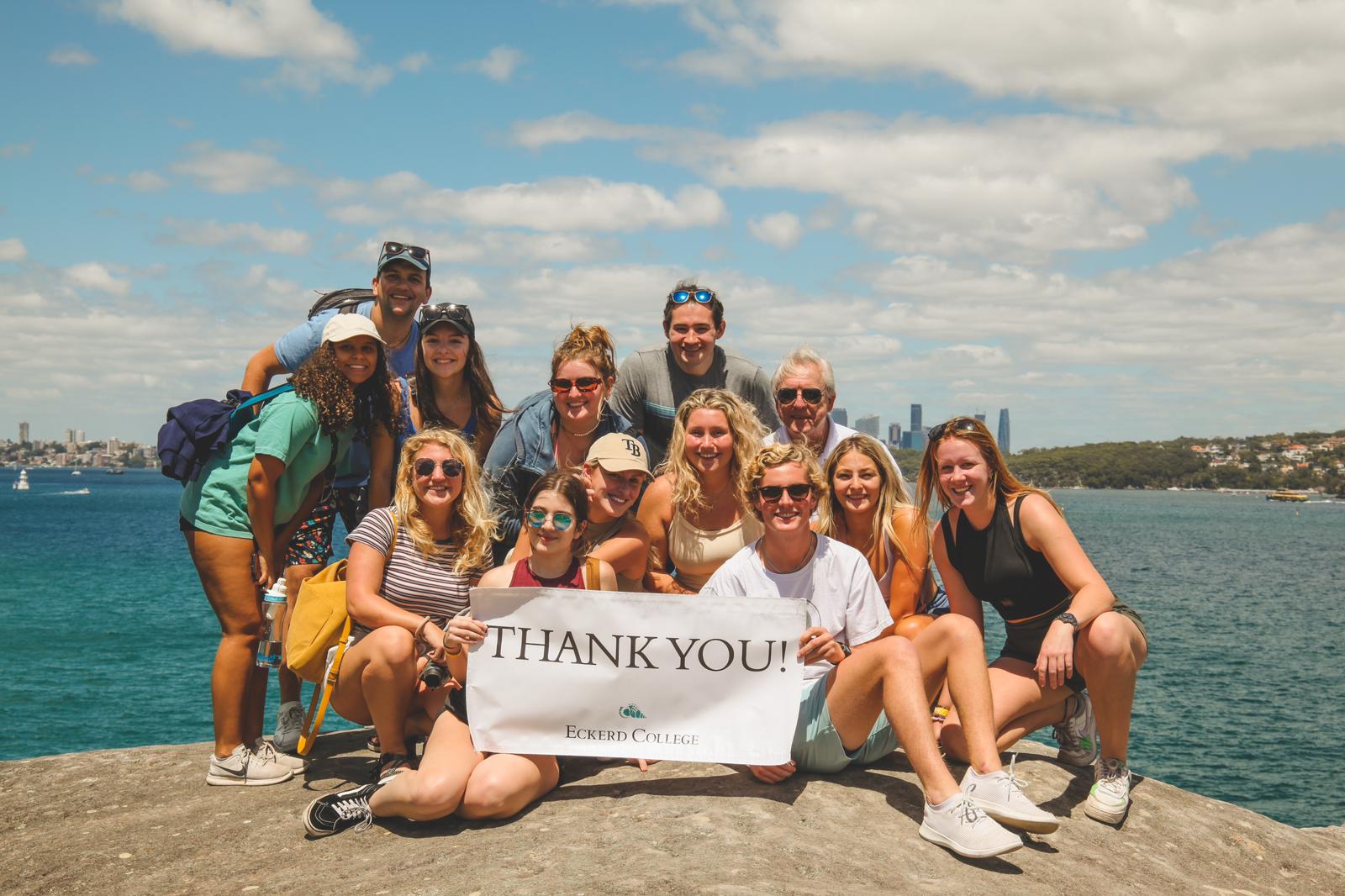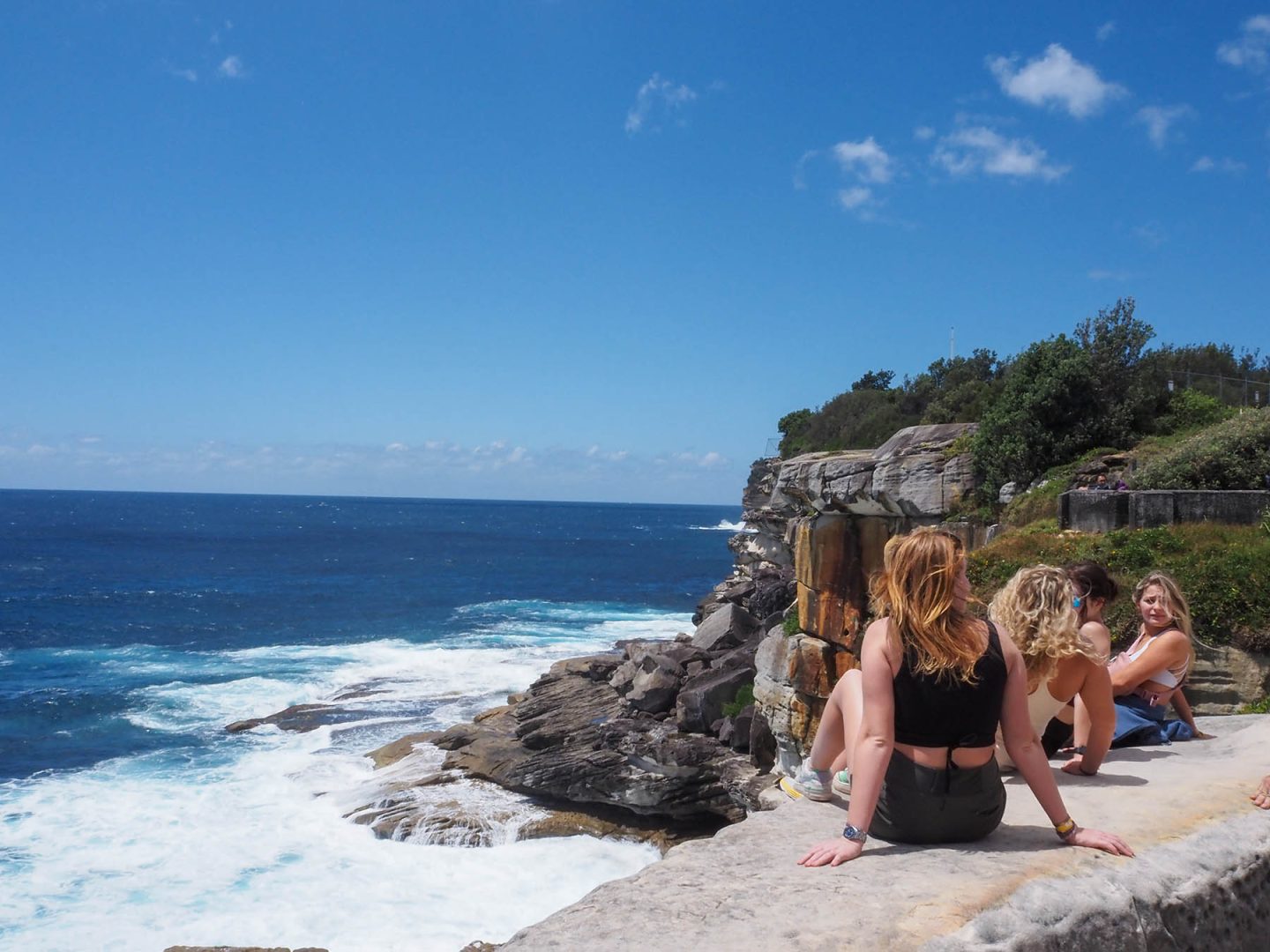On the third day that Assistant Professor of Finance Bob Jozkowski and the 13 students in his “Business and Sport in Australia” Winter Term class spent in Sydney, the group visited Manly Beach to participate in the “Bold and Beautiful.”
This swimming event that takes place in the Manly community each morning isn’t organized the way a 5K at the YMCA would be in the States, but there were almost 7,000 people joining in friendly competition that day.
Eckerd students Brooke Bisko, Ellie Cole, Elliott Curry, Bella Faiello and Ethan Godfrey limbered up and prepared to swim the 1.5 kilometers from Manly Beach to Shelly Beach among the throng of Aussies—including an Australian Olympic swimmer.
Brooke, a junior international business student from Bethlehem, Pennsylvania, says she was touched by how many people checked in on them as they swam. Just a quick “Are you all right, mate?” made her feel more comfortable and cared for.
For the first time in the history of Eckerd College, a cohort of students traveled to Australia during Winter Term. Their time was split between Australia’s two biggest cities, Sydney and Melbourne, where they would gain a deeper understanding of how sport, business and communication interact in Australian culture. Students also saw the inner workings of an international sporting event by attending the Australian Open tennis tournament.
A collectivist attitude revealed itself as a primary part of Australian culture.
Sportsmanship and community
Students heard the story of the Bold and Beautiful swim squad from an acquaintance Jozkowski made when he and his wife lived in Sydney in the ’90s. It had started with a woman who wished she was a stronger swimmer, so she decided to swim the 1.5-kilometer distance every morning. After a few days, some of her friends joined her. And then some of their friends jumped in too. The group expanded exponentially each morning, until it exploded into a daily community event.
This time, when the first swimmer made it back to Manly Beach, completing the swim, he didn’t throw his hands up or celebrate in any way. He knew he had come in first and walked calmly back to his towel before cheering on the other swimmers. The second swimmer did the same. Jozkowski’s friend explained that the winners knew where they stood and didn’t feel the need to gloat.
As the days in Sydney passed, students began to appreciate the charming city—at once vibrant and alive, but also incredibly laid-back.

Brooke Bisko with kangaroo
The class visited Walkabout Wildlife Sanctuary in Calga, about an hour outside of Sydney. Upon the students’ arrival, a swarm of free-roaming kangaroos, wallabies and emus greeted them. A park ranger provided a safety briefing, and then students were given some free time to enjoy the animals. At this sanctuary, they don’t hand-feed any of the free-roaming animals because when they learn they can take food from humans, they often become aggressive. All of their food is scattered on the ground, and the rangers blow a horn to signal mealtime. Brave souls were allowed to pet the animals, but only on their butts; touching anywhere else is how they communicate with one another to initiate fights, and their legs are powerful.
The owner of the park, Tassin Barnard, shared her background in insurance and the business world and how she transitioned into running this operation. It was a long and taxing journey. She and her husband, Gerald, had to endure a 15-year lawsuit against a mining corporation that wanted their land. They almost went bankrupt, and the emotional toll came close to ending their marriage. But they persisted, only to be threatened by devastating bushfires. The Barnards needed to evacuate all the animals to keep them safe. They didn’t know where they would go or what they would do, but Tassin Barnard made a FaceBook post. The Calga community rallied around them—donating food, supplies, effort and time. Miraculously, all of the animals were saved. Barnard emphasized that even when it seems like there’s no way, people are willing to help. People are helpful, and social media is powerful.

Juniors Ethan Godfrey (left) and Bella Faiello sample termites.
At the Walkabout, park rangers led Eckerd students on a hike through the bush. Students washed their hands with the leaves of a tree that has antibacterial properties, ate live termites (they taste like black pepper), and learned about the healing properties of several other trees.
Deep in the bush, they came upon a cave with ancient paintings and handprints of aboriginal people. These paintings have been there for thousands of years. There also were carvings in various rocks along the path that aboriginal tribes used to indicate wildlife living in the area and sources of freshwater. These sites are the reason the Barnards fought so hard to preserve the land. Periodically, aboriginal people are invited to produce controlled bushfires to keep the land healthy.
A collective of individuals
Students also spent time focusing on how Australian business culture compares to American business culture. On Jan. 12, Jozkowski’s class sat down with a few members of the Fidelity Investments team in the Sydney office. This meeting was coordinated by Eckerd College Board of Trustees Chair Ian Johnson ’89. They also met staff from Franklin Templeton Investments in Melbourne, thanks to coordination by Eckerd board member Ronice Barlow ’91. Franklin Templeton has been a long-time friend of Eckerd College, so students were greatly aware of the importance of this meeting.
Even in a business setting, Australia’s culture of togetherness was obvious. Staff from both companies commented on the camaraderie that exists in the workplace. Most businesses there don’t run on a hierarchical structure. When co-workers go “on holiday,” everyone in the office knows where they’re going.
Junior international business and marketing student from Pittsburgh, Pennsylvania, Bella Faiello raised a question during a meeting about whether they would consider Australia a more individualistic or collectivistic culture. In social aspects, the Aussies agreed they have more collectivist tendencies, specifically when it comes to healthcare and education. The business world looks a little different; it’s more complex than tax dollars. In business, corporate goals drive companies forward. It’s a more competitive environment, and it’s individualistic in the sense that you have to do what’s best for you and your family. Aussies strive for individual gain, but they have little interest in gloating about their successes.














